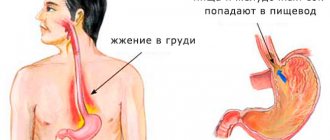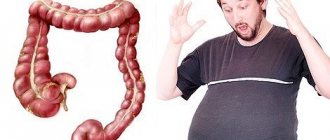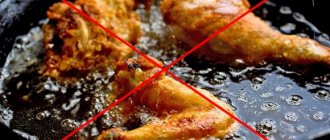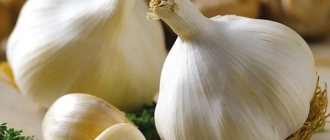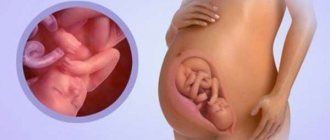Heartburn at night can periodically occur in every person who has made mistakes in nutrition. A burning sensation in the epigastric area that occurs during sleep forces the sleeper to frequently change position in order to get rid of the unpleasant sensation. If heartburn occurred once and did not recur, then there is no cause for concern: you probably just had dinner too late. But if heartburn is severe and attacks occur repeatedly, it is necessary to find out what caused it and begin treatment to avoid possible harmful consequences.
Why does heartburn appear at night?
Heartburn can occur at any time. However, in the evening or at night the development of an attack is most likely.
The reason lies in the peculiarities of human physiology: during sleep, the muscles relax, the sphincter does not completely cover the opening between the stomach and the esophagus - as a result, the contents of the stomach or gastric juice (it contains hydrochloric acid) partially enters the esophagus. Semi-processed food or gastric juice irritate the walls of the esophagus - this is the reason why heartburn appears at night.
Unpleasant sensations in the esophagus - what could it be?
In addition, at night (from 10 pm to approximately 2 am), the production of saliva decreases - this is how the functioning of the body is “tuned”. Saliva neutralizes the dangerous effects of hydrochloric acid. Accordingly, the esophagus takes a longer period to clear itself of the acid that entered it during the digestion of food, which creates the preconditions for a burning sensation.
Heartburn caused by simple physiological causes and not associated with serious illness can be managed by changing body position. Doctors recommend sleeping on your right side - in this case, the likelihood of hydrochloric acid reflux into the esophagus is reduced.
Prevention of evening heartburn
Large juicy, fatty meals and eating before bed are common causes of sudden burning. Signs of heartburn may appear if the daily routine is not followed. Measures to prevent negative symptoms include:
- Rejection of bad habits.
- Walking before bed.
- Changing eating habits.
- Reduce portion sizes.
- Wearing loose clothing.
- Avoiding foods and drinks that cause the production of digestive enzymes.
Body weight also plays an important role in the development of heartburn. Overweight people have higher pressure on the stomach. A balanced diet to maintain a healthy body weight is important in prevention.
Night heartburn: causes
It is impossible to answer the question why heartburn often occurs at night without conducting a comprehensive examination of the patient.
Among the causes of nighttime heartburn, in addition to poor nutrition and a sedentary lifestyle, doctors note diseases of the gastrointestinal tract.
If a burning sensation behind the sternum persists regularly, you should visit a doctor. It is possible that constant heartburn became a signal from the body about pathological changes in the gastrointestinal tract - inflammatory and other diseases.
Most likely:
- gastritis or stomach ulcer;
- duodenitis;
- GERD;
- cholecystitis;
- diaphragm hernia.
Gastritis, stomach ulcer
With gastritis and ulcers, very severe heartburn can appear during an exacerbation almost every night. This is due to the fact that at night an empty stomach begins to digest itself: gastric juice is actively secreted and corrodes its walls.
In most cases (though not always), the development of gastritis and ulcers is associated with the presence in the body and uncontrolled reproduction of the bacterium Helicobacter pylori. Fixing itself on a certain area of the organ, the bacterium causes constant irritation, then inflammation. Small ulcers appear, actively irritated by aggressive gastric juice. The result is pain and heartburn, which torments the patient in the evening and at night.
Inflammation of the duodenum
With duodenitis, an area of the duodenum becomes inflamed. Since the mucous membrane is constantly irritated, regurgitation occurs, and as a result, attacks of heartburn.
Gastritis, stomach ulcers and duodenitis are accompanied by severe pain and sometimes nausea.
Gastroesophageal reflux disease
Gastroesophageal reflux (GERD) also often manifests itself as heartburn. True, this is not the only symptom of the disease. Reflux occurs when the sphincter weakens and part of the semi-digested food enters the esophagus after it has been in the stomach. The patient may:
- heartburn;
- feeling of heaviness in the epigastrium;
- bloating;
- belching;
- flatulence.
Reflux is sometimes congenital, but more often appears with age.
Cholecystitis
Cholecystitis is an inflammation of the gallbladder. Improper secretion of bile provokes pain, heartburn, a feeling of fullness and heaviness in the right hypochondrium. There may be a bitter taste in the mouth. Sometimes a person suffering from cholecystitis may confuse it with liver disease, which can also manifest itself as pain, heartburn and a feeling of heaviness.
Diaphragmatic hernia
A diaphragmatic hiatal hernia (HH) is often accompanied by a burning sensation in the retrosternal area. In the case of a diaphragmatic hernia, parts of the gastrointestinal tract begin to penetrate into the chest cavity through an opening in the diaphragm. Characteristic features of hiatal hernia are nighttime heartburn, burning sensation in the chest after eating, and frequent belching.
Treatment of hiatal hernia without surgery
Osteochondrosis
Sometimes heartburn occurs due to osteochondrosis of the thoracic spine. The reason is compression of muscles and internal organs caused by changes in the location of the vertebrae. In such cases, there is no need for complex treatment of the gastrointestinal tract; it is enough to periodically undergo a course of massage, monitor correct posture, and if it is impossible to correct it, wear a special corset. In childhood and adolescence, you can completely straighten your posture and at the same time get rid of heartburn forever.
Attention! Very severe or sudden heartburn in a person who does not suffer from gastrointestinal diseases can signal a myocardial infarction. Pain in the heart muscle is disguised as heartburn. Therefore, it cannot be tolerated, especially if a problem arises in older people - it is necessary to call an ambulance.
Diseases that cause heartburn
Burning and other painful sensations in the stomach and esophagus most often appear in the patient if there are any diseases. The most common of them may be gastritis - in this case, heartburn becomes a consequence of gastric juice entering the gastrointestinal tract. A liquid whose acidity is noticeably increased irritates the esophageal mucosa and leads to pain. Sometimes this happens immediately after eating, in other cases – several hours after eating.
Other reasons that may cause the symptom to appear (and additional studies will help clarify this) include the presence of the patient:
- duodenitis , which is characterized by the appearance of heartburn not only after eating, but also at other times. However, in the evening and at night the patient feels the burning sensation stronger than usual;
- a disease called GERD , characterized by both heartburn and severe pain in the upper part of the stomach;
- chronic cholecystitis, a sign of which is also pain on the right side, especially after traveling by transport or eating fatty foods;
- Gastrointestinal diseases - gastritis or ulcers. Such problems often occur in young patients. And, if most of the other diseases are mainly characteristic of older people, almost anyone can suffer from ulcers and gastritis.
Another disease that can cause or be a concomitant factor in the appearance of heartburn is a hernia in the area of the diaphragm or hiatal hernia. Most often, burning and pain are felt by the patient after taking a horizontal position or while bending. The symptom is observed in the stomach, back and heart. And when the patient gets up, the pain practically disappears.
Consequences of heartburn during sleep
The most common causes of a burning sensation behind the sternum and even in the throat are weakening of the sphincter tone and increased production of gastric juice.
In case of a single mild attack, you can simply drink a glass of still mineral water in small sips or take a pinch of soda. It is not recommended to experiment with the latter - the method is suitable for extremely rare use.
If unpleasant sensations are constantly present or occur frequently, you should consult a doctor for examination. The effects of heartburn at night can be quite unpleasant.
Heartburn, which is caused by physiological changes without organic disorders, can provoke an inflammatory process. Regular irritation of the esophagus and stomach will lead to the fact that the patient can “get” acute or chronic gastritis, which over time transforms into an ulcer, inflammation of the esophagus.
Long-term heartburn causes esophagitis. The patient begins to suffer from belching, ulcers and erosions appear.
In turn, advanced esophagitis is a prerequisite for the formation of Barrett's esophagus. This disease is considered dangerous because malignant neoplasms often develop against its background.
Diet for Barrett's esophagus (sample menu for a week)
Therefore, it is necessary to be examined in time and prevent serious consequences.
Important! The patient should be immediately sent to the doctor if, in addition to heartburn, any of the following phenomena are observed:
- vomit;
- headache;
- temperature increase;
- tarry stools;
- lack of appetite and sudden weight loss.
In any case, repeated heartburn cannot be ignored.
Why does it occur
Heartburn at night is fraught with the main danger - it can be the development of oncology in the esophagus and stomach. Cancer cells begin to divide with prolonged exposure to hydrochloric acid on the esophageal mucosa. The causes of heartburn lie in the reflux of undigested food with a large amount of acid into the esophagus. At night, saliva is not secreted, so it cannot neutralize the acid. Heartburn at night has numerous causes, and they do not always indicate any disease. Here are the safe ones:
- Systematic overeating before bed.
- Having bad habits. If you smoke a lot or drink alcohol before going to bed, then nighttime heartburn is guaranteed.
- Poor nutrition. Uncontrolled consumption of coffee, carbonated drinks containing dyes, eating spicy and salty foods.
- Treatment with certain medications. If you take a painkiller in the evening, severe heartburn will certainly occur at night. Or it happens during any illness, if you take a lot of medications.
- Uneven distribution of physical activity. When vigorous activity is performed before dinner, digestion of food will be difficult. Undigested food will cause a burning sensation in the stomach.
Some diseases or the patient's condition provoke heartburn in sleeping people:
- Pathological fatigue.
- Constant stress.
- Weakening of the muscles that help move food down the esophagus.
- Carrying a baby.
A burning sensation in the esophagus at night is a sign of the disease. The following diseases can cause the presented symptoms:
- Gastritis. Characterized by thinning and inflammation of the stomach walls. Accompanied by pain, nausea and burning. Occurs during an exacerbation when, before going to bed, you eat something that is prohibited.
- Stomach ulcer. Its symptoms are burning and nausea, usually at night.
- Duodenitis. This is an inflammatory process of the duodenal mucosa. Accompanied by severe pain in the intestines and flatulence.
- Cholecystitis. Its chronic form provokes a burning sensation in the sternum during sleep.
- Diaphragmatic hernia. If it is present, severe heartburn occurs.
- Sick stomach and other organs of the digestive system.
Before you treat heartburn, you need to find out why it happens. To do this, you need to see a doctor and undergo an examination. If heartburn is not associated with exacerbation of chronic diseases, then coping with it will not be difficult.
Heartburn that appears after sleep, on an empty stomach, occurs due to the following diseases:
- Inflammatory processes of the walls of the stomach and duodenum.
- Unhealthy diet and obesity of any degree leads to heartburn due to indigestion and intra-abdominal pressure.
- Features of the location of the stomach, congenital or acquired, leading to frequent releases of gastric juice into the esophagus.
- Late pregnancy due to intra-abdominal pressure.
Each case has its own characteristics, which will help the doctor, after examination, establish an accurate diagnosis and prescribe treatment.
Causes of heartburn at night in pregnant women
Heartburn that occurs at night in pregnant women is explained by additional reasons in addition to those mentioned above.
Heartburn at night during sleep in the early stages can occur due to a sharp increase in the production of the hormone progesterone in the body of the expectant mother. This hormone is necessary for the normal consolidation and full development of the fetus; it relaxes the uterus, preventing it from rejecting the “stranger”. At the same time, it relaxes other smooth muscles. The intestines work worse, the lower esophageal sphincter weakens. The result is that food is thrown into the esophagus when the expectant mother assumes a horizontal position.
In the later stages, another provoking factor is added - an increase in the weight of the growing uterus. The uterus causes internal organs, including the stomach and intestines, to shrink and shift, disrupting their normal functioning - the pregnant woman wakes up at night from a burning sensation in the chest.
This will not cause any consequences for the child. But the mother must definitely prevent constipation and esophagitis.
Use of medications
Most often, in the complex treatment of evening and night heartburn, medications from the following pharmaceutical groups are used:
- Antacids - protect the mucous membrane of the stomach and intestines from the aggressive effects of acid (Gastal, Maalox, Almagel, Gaviscon).
- Proton pump inhibitors - reduce the concentration of hydrochloric acid by inhibiting its production (Omeprazole, Rabeprazole, Pantoprazole).
- Histamine receptor blockers - Ranitidine, Zentex, Gistak.
All medications are prescribed by a doctor and are not used for self-medication, since only a specialist can take into account indications, contraindications, and side effects.
If you do not pay attention to nighttime heartburn, you may miss the appearance of severe complications that significantly reduce the patient’s quality of life.
We recommend: How to treat constant heartburn without harm to health?
Night heartburn: causes and treatment
Whatever the reasons, it is necessary to get rid of regularly occurring heartburn so as not to provoke a worsening of the situation.
Heartburn at night during sleep should force the patient to undergo a series of laboratory and instrumental studies. In addition to the fact that a person suffers, the consequences of an advanced disease can be quite unpleasant and even life-threatening in some cases.
If heartburn regularly begins at night, the doctor may prescribe medications aimed at reducing the production of gastric juice, for example, Ranitidine, Omez. You may need antacids (Maalox, Phosphalugel) - they are not prohibited for use by pregnant women. Gastroprotectors (Venter), which protect the mucous membrane of internal organs from the action of hydrochloric acid, cope well with heartburn. Alginates may be required (they create a protective film on the walls of the stomach).
Attention! Since heartburn is not an independent disease - it is only a symptom of a disease, treatment in each case is selected individually.
Treatment
The best way to deal with burning sensation during sleep is to take medication. It is necessary that such drugs are always in the first aid kit for an emergency.
Medicines for burning sensation are sold in pharmacies without a prescription and can be purchased at any time. The action of all medications is aimed at reducing acidity in the stomach, which helps eliminate nighttime illness.
Home Remedies
If there are no medications for burning, you can cope with the discomfort using folk remedies.
What will help:
- Drink a glass of warm water in small sips.
- Prepare a solution of water and soda.
- Drink a glass of warm milk.
- Drink chamomile remedy.
- Chew the calamus roots well.
- Dissolve a little salt.
- Eat walnuts.
- Drink an infusion of flax seeds.
- Eat carrots, preferably raw.
- Drink 1 tablespoon of vegetable oil.
All these remedies will help relieve symptoms for a short time and get rid of the burning sensation, after which you should contact a gastroenterologist and undergo an examination to identify the causes and begin treatment in a timely manner.
Which doctor should I contact?
First of all, you should visit a general practitioner who will give you a referral to a gastroenterologist. The following will help determine the causes of heartburn at night:
- FGDS;
- esophagomanometry (measurement of pressure inside the esophagus);
- general and biochemical blood tests;
- breath test for Helicobacter;
- Ultrasound of the abdominal cavity.
Only after this is treatment prescribed.
Severe heartburn at night: what to do
“I wake up at night with severe heartburn,” if you can say this about yourself, you can try using folk remedies before seeing a doctor.
At home, you can provide yourself with accessible first aid:
- alkaline mineral water without gas;
- warm milk (you need to be careful with this product; in some people, milk can cause an increase in stomach acidity);
- Activated carbon;
- nuts;
- carrot juice;
- buckwheat.
How to get rid of heartburn accompanied by vomiting? You need to drink a suspension of 5-8 crushed tablets of activated carbon with water. If possible, consult a doctor.
What to do if you have belching, heartburn, or a feeling of heaviness? You can drink a glass of mineral water or milk in small sips. You can keep ready well-dried and crushed buckwheat in the oven, which you eat a pinch in the morning on an empty stomach. Try drinking a glass of freshly squeezed carrot juice or simply nibbling on a carrot.
There is no need to use soda to relieve heartburn. If you get carried away with this “treatment”, the production of gastric juice will increase – heartburn will “visit” more often.
How to get rid of heartburn?
Heartburn - causes, symptoms, treatment, dietary table
The basis of treatment for any disease of the gastrointestinal tract is diet. Nutrition for heartburn includes:
- refusal of alcohol, coffee, chocolate, mint, carbonated drinks, fatty, spicy and fried foods, citrus fruits and their juices, tomatoes and products based on them;
- exclusion of foods that are not included in the classic list, but can cause heartburn in a particular patient (to find out, you need to keep a food diary);
- split meals (5-6 times a day) in small portions, under no circumstances overeat to the point of feeling heaviness and fullness in the stomach;
- The last meal and drinks should be no later than 3 hours before bedtime.
For patients suffering from heartburn, it is better to raise the head of the bed by 25-30 centimeters. If you are overweight, you should try to get rid of it, because it is a trigger for heartburn.
If these measures are not enough, you should consult a doctor. Only a specialist can determine the true cause of heartburn and select the right medications in the right dosage.
To eliminate heartburn, its causes and consequences, prokinetics, gastroprotectors, antacids, proton pump inhibitors (PPIs) and H2 blockers are used.
Prokinetics (itomed) improve gastrointestinal motility, thereby improving the process of gastric emptying and normalizing intragastric pressure. These drugs increase the tone of the lower esophageal sphincter, due to which it begins to correctly perform its function - to protect the esophagus from the acidic contents of the stomach. Thus, prokinetics allow you to achieve a long-term effect: they act on the cause, and do not immediately “extinguish” heartburn.
Hydrochloric acid, getting on the delicate mucous membrane of the esophagus, injures it. To restore the mucous membrane, gastroprotectors (for example, rebamipide). They promote rapid healing of damaged areas and strengthen the natural protective layer.
Antacids (Gaviscon, Almagel, phosphalugel, Maalox) can be used if heartburn attacks are relatively rare. These medications are like first aid for heartburn - they eliminate the symptom here and now, but after a while it returns if the source of the problem persists.
Proton pump inhibitors (omeprazole, lansoprazole, pantoprazole, rabeprazole) reduce the acidity of gastric juice. As an alternative, H2 blockers (ranitidine, famotidine, cimetidine, roxatidine) can be used. This is also a temporary relief for heartburn. No drug - no effect.
Separately, let's say about the ancient folk remedy for heartburn - soda. It is better to forget about it once and for all, because carbon dioxide released when neutralizing acid increases pressure in the stomach and stimulates the production of gastric juice. Heartburn disappears for a short time, and then returns with a vengeance.
What not to eat before bed
If you are prone to heartburn, you should exclude fatty, salty, and spicy foods from your evening meal. It is not advisable to eat tomatoes or drink tomato juice. Carbonated drinks and coffee also provoke nighttime heartburn.
During dinner, try to eat fruits and vegetables. In the evening, the last meal should be taken 2-3 hours before bedtime, no later. This way the stomach will have time to process everything.
What you can and cannot eat if you have heartburn
Frequent strict diets also provoke heartburn because they cause disturbances in the functioning of the gastrointestinal tract and contribute to poor absorption of vitamins and nutrients.
Prevention
You can prevent attacks of nighttime heartburn or reduce them to a minimum (of course, in the absence of serious pathologies of the gastrointestinal tract) by accustoming yourself to maintaining a proper diet and leading an active lifestyle.
If you smoke, quit the habit. Try to consume a minimum of alcohol. Remove fatty, poorly digestible, heavy foods from your diet. Don't have dinner late or in large quantities.
Learn to deal with stress - disruptions in the functioning of the nervous system affect the functioning of the entire body.
Start running, do exercises, remember the 10 thousand steps rule - in a word, go in for sports in the form that is available to you. In order for the organs of the gastrointestinal tract to function normally, it is necessary to stop leading a sedentary lifestyle.
Heartburn is not a disease as such; rather, it is a signal that the body gives, trying to “explain” to us that something is wrong with it. Most often, this is just a temporary glitch, but some kind of illness is also possible, so be sure to conduct an examination and find out the causes of the discomfort.

